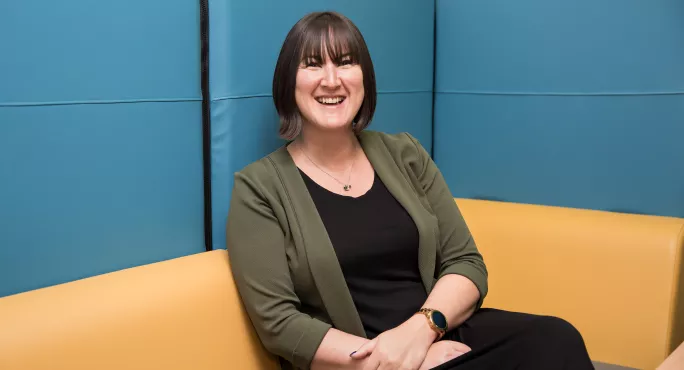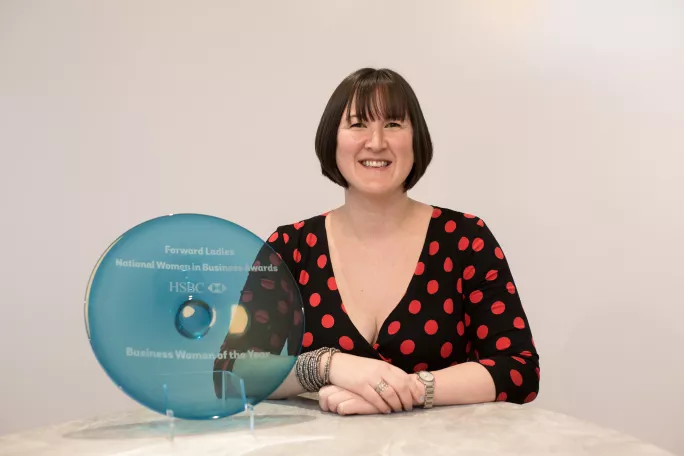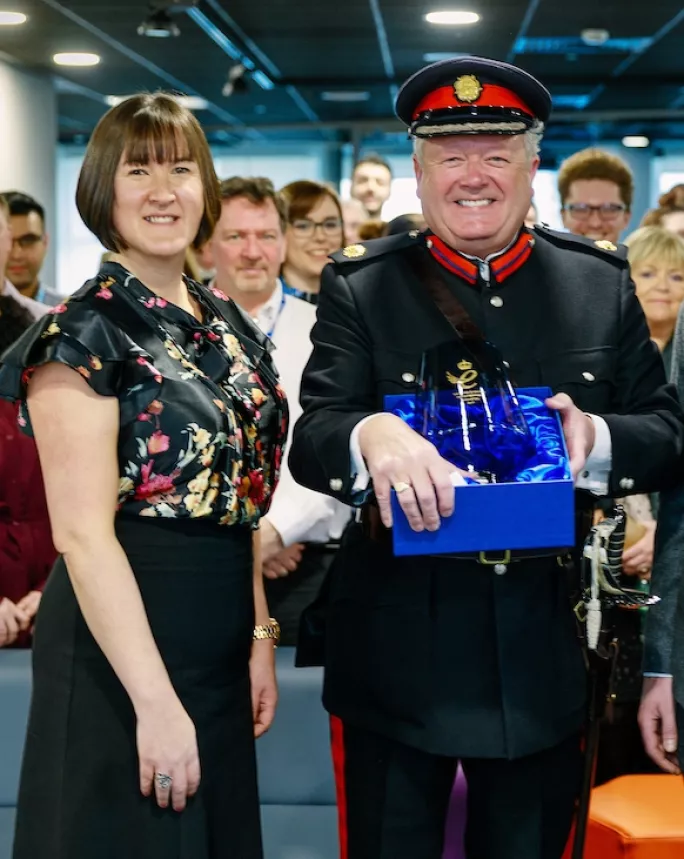
- Home
- Meet the tech founder transforming apprenticeships
Meet the tech founder transforming apprenticeships

“I never grew up thinking I would found a tech company," admits OneFile founder Susanna Lawson. "When I went to university, I didn’t think I would. Even when I founded a tech company, I didn’t think I was founding a tech company.
“It’s only really been the last five or six years that I’ve gone, 'Hang on, this is a special thing, being a female tech founder.'”
As it turns out, Lawson has founded quite the tech company. OneFile is used by more than 700 colleges, providers and employers across the country. Her customers include police forces, the NHS, Specsavers and Transport for London.
News: New league table to highlight employers leading ‘apprenticeship revolution'
Skills: 'My apprenticeship got me on the career ladder'
Background: How to boost apprenticeship starts
So what exactly does it do? Put simply, OneFile is an e-portfolio that's transformed the way apprenticeship progress is tracked. Once upon a time, apprentices had a physical folder which held all the information they, their employer and their provider needed to track their development. This file could only be in one place at one time – which brought obvious drawbacks. “I’d drive for three hours to see an apprentice and look at their file for them to tell me they left it at home,” recalls Lawson.
But with OneFile, the portfolio is accessible online – everyone can look at it remotely, on any device, allowing them to tick off competencies, give feedback and assess progress. It's a system that's appealed to private companies tracking their own internal training, too.
The OneFile story
It's a simple idea. But OneFile has had a huge impact – and has the awards to prove it. This year it was named Saas Company of the Year at the North Tech Awards.
In 2017 it won the Forward Ladies Queen’s award for innovation. At the same ceremony, Lawson won Forward Ladies’ digital leader of the year and businesswoman of the year gongs.
“[Digital leader] was the first award up. I’d already earmarked the person that I thought would win, but they called my name out," Lawson recalls. "I was blown away. I was like, 'I’m happy now, that’s brilliant.'
“Then, when they started describing the overall businesswoman later on, I turned to my mum and said, 'Oh my god, she sounds amazing!' And my mum looked at me and she went, 'They’re talking about you.'
“I just had no idea. I suppose it’s that imposter syndrome, that feeling of, 'Oh God, are they going to find out that I shouldn’t really be here?' It’s been amazing, it’s opened up a lot for me.”

Susanna Lawson: From HE to FE
Lawson has come a long way. As a child, she moved around a lot – her dad was in the prison service, her mum a nurse. The family lived in Kent, Leicestershire and Yorkshire. She went to several primary schools and high schools, but doesn’t dwell on the challenges it posed for her growing up. Lawson says that she loved school: after completing her GCSEs and A levels, she went to the University of Manchester to study psychology.
After university, Lawson had her first experience of further education. She started working with adults with learning disabilities – but found herself earning the minimum wage. She asked her employers what she needed to do to get a pay rise. They told her that she needed to do a level 2 NVQ in care.
“At first I was really indigent, 'Why do I need to do a level 2? I’ve got a degree in psychology,'” she recalls, laughing.
But the practical element of the course appealed to her, and after passing her level 3, she was asked to be an assessor. Lawson spent the next few years assessing and training other members of staff at her care home, before leaving to work at a private training provider which offered apprenticeships, first as an assessor and, then, as national contracts manager.
It was in this role that the idea of OneFile was born. Lawson would spend hours ringing assessors across the country asking about their apprentices’ progress. They would respond with vague responses: “They’re nearly finished” or “They’re about half-way through”.
“I’d think, 'I can’t put "nearly finished" in a spreadsheet.' I started thinking, 'If it was all electronic, I could tick off the competencies, then I could just press a button,'” she explains.
Transforming apprenticeship assessment
A conversation with her boyfriend – now husband – Chris, a web designer, led the two to spot a gap in the market, do some market research and launch OneFile in 2005. The couple worked out of their spare room in Manchester for the first few years, clocking up, Lawson estimates, about 80 hours a week. It was a steep learning curve: they taught themselves marketing, sales, product development, scaling and technical support. Two years later, they hired their first member of staff – “That was a really, really big deal,” says Lawson – and moved out to their first offices.
The quick expansion of the business came with sacrifice. “We got married the year that it launched when I was 29, and we made a conscious decision not to have kids at that point," Lawson says. "There was just the two of us and we didn’t have a team to support us. What if I wanted time off?"
Four years on, the couple decided the time was right to start a family. After having time off to raise her children, Lawson decided to become the face of the company, with her husband becoming the managing director. Eighteen months ago, however, he decided to step back and go into product development, and Lawson was made CEO. She was officially appointed to the role a year ago.
Lawson is acutely aware that she is a female tech founder in a predominantly male world. "Whenever I’m out at conferences, somebody will always ask me: 'Who’s got the kids?'" she says. "That’s both men and women who are asking that. They don’t mean to be sexist, but someone will always ask me that. I tell them, 'My husband's got them.' But if it was my husband here, no one would ever ask him that. It’s just presumed that the wife’s got them at home."

Diversity in edtech
So how can we ensure that in five, 10 or 20 years' time, Lawson isn’t an exception, but one of many female industry leaders?
“It’s all about seeing successful role models. You can’t be what you can’t see. I read some research in which they asked schoolgirls what subjects you need to study at A levels to get the highest-paid jobs. They all said Stem subjects. But then, when it came to them choosing their A levels, they didn’t choose them. That’s really depressing. They understand what A levels they need to take, but they’re being put off it for whatever reason,” she says.
OneFile welcomes students for work experience. To open their eyes to various job roles, OneFile puts them on a five-day programme in which they spend each day in a different department.
“They need to see different genders working in different teams – I’ve got a big bee in my bonnet about diversity in tech, and the need to have a diverse tech team,” Lawson says.
She points to her own experience to highlight the importance of not just more women in tech but different ethnicities, too.
“I’m half-Chinese and my mum’s surname is Ng. When I have to type in my mother’s maiden name on certain websites, I can’t because you have to have a minimum of three characters. They’re not being racist, but they don’t have a diverse tech team so they don’t know there’s an issue.
“There are lots of issues in AI. Only one in 10 AI engineers is a woman, so you’re missing out on that whole diversity issue. With technology, especially with AI – this thing that’s going to solve all of our problems – it’s only as good as the people who are coding it. If they’re all male, white, middle-aged, how do they know the problems we want solved?
“If we don’t do something about it, especially with AI, we are going to have a major, major problem on our hands,” she says.
Lawson hopes that her success – and the success of her business – will encourage other women to have the confidence to pursue a career in Stem.
“I get asked to speak at lots of events and I think that’s great, it gives me an opportunity to share my story about how I started and the challenges that I had.
“Ideally, there wouldn’t need to be a 'businesswoman of the year' award, but while they're still a minority, there’s still work to be done. It’s good to have role models and to be able to celebrate the success of women in those areas.”
Register with Tes and you can read five free articles every month, plus you'll have access to our range of award-winning newsletters.
Keep reading for just £4.90 per month
You've reached your limit of free articles this month. Subscribe for £4.90 per month for three months and get:
- Unlimited access to all Tes magazine content
- Exclusive subscriber-only stories
- Award-winning email newsletters
You've reached your limit of free articles this month. Subscribe for £4.90 per month for three months and get:
- Unlimited access to all Tes magazine content
- Exclusive subscriber-only stories
- Award-winning email newsletters



